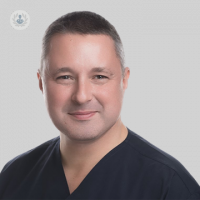Why have advanced prosthodontics?
Written in association with:Prosthodontics is the art and science of the restoration of teeth that have been damaged by disease or trauma. It covers everything from fillings to full dental reconstruction using veneers, crowns, overlays, bridges and removable dentures. These may be on natural teeth or on dental implants. The objective of prosthodontics is to maintain function, comfort and appearance for the patient whilst maintaining as much of the natural dentition as possible.
It often involves making complex decisions not only about the restoration of individual teeth but often how to restore all of the teeth in the mouth within the framework of the patient's facial appearance, bite function and also realistically their available time and financial budget.
Dr Koray Feran is the Clinical Director at The London Centre for Implant and Aesthetic Dentistry. Here, the expert dental surgeon explains everything you need to know about prosthodontics.

What is advanced prosthodontics?
If done carefully, all prosthodontics is “advanced”, but I would suppose that the word advanced is used more when the extent of the work required encompasses the whole mouth and the decision tree for the ideal treatment is complex.
Dentists often refer to cases as being “conformative” where the work that is being done fits in with the existing bite and appearance. However, if the whole bite, appearance and arrangement of the teeth is to be changed then we normally call that a “reorganised” case. A very good working knowledge of bite dynamics and tooth anatomy is required for more complex cases.
Why get advanced prosthodontics?
Usually, because you have to! We most often see patients who have had extensive but piecemeal dentistry in the past. Due to a variety of reasons this work is now failing due to long-term wear and tear, or new disease.
Sadly prosthodontics is necessary in most cases because prevention or maintenance has failed. The patient has often suffered new diseases such as decay or gum disease leading to loss of teeth or had dentistry that was more destructive than it needs to be, where today we have much more conservative ways of maintaining teeth than in the past.
A vast amount of our time is spent replacing old dental work that has succumbed to the ravages of time or new decay or where inadequate hygiene maintenance has led to further loss of teeth.
Are advanced prosthodontics the future of dentistry?
There will always be a need for advanced prosthodontics as there will always be dental disease as long as there is a high sugar diet or susceptibility to gum disease that leads to loss of teeth. Trauma and other oral diseases such as cancer will also require advanced prosthodontic care and maintenance.
However, one big advantage for us is the progressive digitisation of the dental workflow such that planning and manufacture of complex restorations will be made easier as the technologies of intraoral scanning, 3D digital modelling and CADCAM techniques advance.
They are already here and the future will no doubt see a much more uniform quality of prosthodontic laboratory work. The skill of a laboratory is obviously key in providing the veneers, crowns and bridges required to restore patient's teeth. The knowledge, experience, diligence and skill of the dental technician is often overlooked but is such a vital part of our team that without our technicians most prosthodontists would be pretty useless!
What makes for a successful experience at The London Centre for Implant and Aesthetic Dentistry?
Our team consists of restorative and specialist dentists, dedicated nurses, hygienist and therapist who see patients regularly and have a unique ability to track the disease processes in patients over a long period of time and collate very helpful statistics on our success and failure rates. We also have our patient coordinators and receptionists who organise everything and our laboratory technicians who work quietly but intensely in the background. All are of paramount importance in the care that we deliver to individual patients.
Teamwork, learning together and receiving feedback from our patients on their experiences allow us to provide treatment where even 15 to 20 years after extensive dentistry many of our patients do not require any further work due to the quality of what was carried out originally and the maintenance programme that they follow with our hygienist and therapist thereafter.
We have a great formula that will only get better with time. However the take-home message, no matter how good prosthodontics is, it is always a second substitute for healthy natural teeth. Prevention and regular maintenance with the hygienist is still king!
To schedule a consultation with Dr Feran, visit his Top Doctors profile today.


